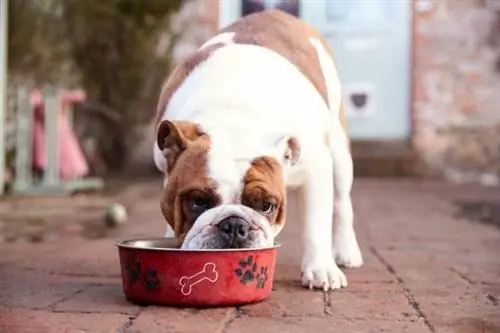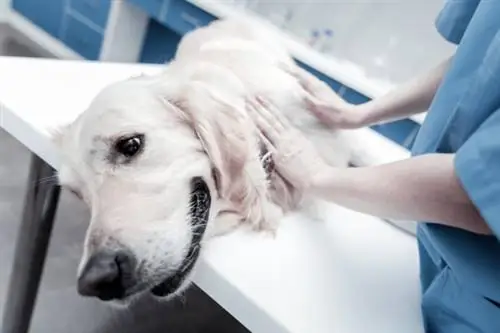- Author Carl Johnson johnson@fascinatesanimals.com.
- Public 2023-12-16 06:19.
- Last modified 2025-01-23 08:59.

indigestion or indigestion is characterized as a general indisposition caused by excessive food consumption or by some digestive difficulty. Not only we, human beings, can be affected by these episodes, but indigestion in dogs is more common than we tend to imagine.
Although we are used to thinking of indigestion as something normal or as a "minor problem", episodes of indigestion in dogs should not be ignored, as they can cause digestive problems, such as accumulation of gases in the gastrointestinal tract, which affect the well-being of the animal. In addition, the habit of eating too much or gobbling food all at once without chewing it, is an alarming risk factor for gastric torsion, one of the most fatal in dogs.
On our site we always strive to provide you with useful content to help you take better care of your most faithful companion. For this reason, we have prepared a special article on pain in dogs, its symptoms, causes and risk factors At the end of the note, you will also find somehome remedies to relieve your furry's indigestion and help him feel better.
Causes and risk factors for overeating in dogs
As we have mentioned, the cause of indigestion in dogs is almost always the excessive or excessive consumption of food, either feed or of human/homemade food. Although any dog can eventually suffer from indigestion, these episodes may be more frequent among those canine breeds that tend to be more gluttonous and eat their food very quickly, practically without chewing it
This gluttonous behavior is one of the risk factors not only for indigestion, but also for gastric torsion in dogs. In addition, performing physical exercise shortly after eating food can also promote indigestion, digestive problems such as gas, vomiting and diarrhea, and end up causing the dreaded stomach torsion.
Dogs that go many hours without eating, as well as those that live on the streets and must feed in a timely or scavenging manner, can also eat very quickly and ingest a large amount of liquids and food at once. just once, to quench the terrible hunger and thirst that afflicts them.
On the other hand, episodes of indigestion can also be more frequent in furry dogs that already have poor digestion due to some underlying he alth problem, as well as in dogs that have allergies or food intolerance and do not receive adequate nutrition for their specific needs.
Dogs that live in a negative environment that causes a context of stress, fear or anxiety, are also more vulnerable to suffering a empacho and develop more severe digestive diseases. Last (but not least), consuming prohibited dog foods could also lead to indigestion.

Most frequent symptoms of indigestion in dogs
Many people wonder how to know when their dog has indigestion or if his food has not been very good for him. In general, the first symptom of an upset in dogs is usually the production of belching and vomiting some time after eating their food.
But the following symptoms of a stuffed dog may also occur:
- Dizziness
- Nausea
- Diarrhea
- Inactivity
- Weakness
- Abdominal discomfort
- Stomach ache
- Lie down in strange positions
- Concern
- Nervousness
How to treat a dog's indigestion?
If your dog eventually shows these symptoms a while after eating his food, it is most likely due to indigestion. Fortunately, an occasional episode of indigestion is not something serious, in fact, almost all dogs have had a stomach ache at some time in their life.
In these cases, the best we can do is suspend the administration of foodof our furry between 12 and 24 hours, depending on the evolution of his symptoms. However, water should always be available to help purify your body and avoid possible dehydration as a result of vomiting or diarrhea.
Once the period of depurative fasting is over, we will need to progressively reestablish his diet, offering him his food in small quantities and several times a day. In addition, we can apply some home remedies to relieve your discomfort and help you digest better, as we will see in the next section.
However, you see that your furry has these symptoms frequently, always eats his food or water very quickly (as if he had a certain "desperation"), or you perceive that your dog is very skinny Despite eating well, we recommend you go to the vet to rule out any pathology or the presence of parasites in your gastrointestinal tract. Later, if possible pathological causes are ruled out, you can consult a canine educator to help you promote better eating habits in your best friend, as well as a calmer state.
On the other hand, if you suspect that your dog may have ingested a dangerous food or toxic substance, don't hesitate to go to the veterinary center or hospital closest to your home. And if symptoms persist for more than 24 hours, veterinary attention will also be necessary.

Home remedies for indigestion in dogs
In the event of eventual indigestion due to excessive consumption of feed or homemade food, we can use some homemade solutions to reduce stomach upset of our furry ones, stimulate their digestive process and keep them well hydrated.
Of course, these natural remedies do not replace the specialized attention of a veterinarian, but they will help us unpack a dog and provide some comfort.
5 home remedies for a sick dog
- Chamomile: Chamomile is one of the most beneficial herbs for dogs, due to its digestive, soothing and anti-inflammatory properties. If you're wondering what to give a dog when his stomach hurts, chamomile tea is the answer you've been looking for. Its infusion relieves stomach discomfort and promotes digestion, resulting in an excellent natural remedy for indigestion in dogs. If your dog is stuffed, you can offer 2 tablespoons of chamomile tea at room temperature, without sugar or sweeteners.
- Cinnamon: There are many benefits of cinnamon for dogs, since this species has anti-inflammatory, antibacterial, antifungal and digestive properties. In moderate doses, it helps relieve muscle spasms, stomach cramps and prevents gas formation. To prevent digestive problems, we can add ½ teaspoon (coffee) of cinnamon in the recipes that we prepare for our furry ones. And to alleviate the symptoms of indigestion, we can offer 1 tablespoon of cinnamon infusion to our dog.
- Turmeric: dogs can eat turmeric and this species is highly beneficial for their body. In addition to being one of the best home remedies for gas in dogs, it is also a great ally in relieving stomach pain caused by indigestion. But it is important to respect the dose of 60mg daily and a maximum consumption of 3 times a week.
- Homemade serum: The homemade serum is a good remedy for those sick dogs that have had vomiting and diarrhea, preventing a possible picture of dehydration. On our site, we teach you how to prepare a homemade whey in an easy and simple way.
- Probiotics: If you are wondering how to cleanse the stomach of a stuffed dog, probiotics can be your great allies. These strains contain beneficial bacteria and yeasts that promote digestion and purification of the body, help balance the intestinal flora and relieve digestive discomfort. Currently, probiotics are sold in almost all stores dedicated to pets, and you can also opt for natural probiotics such as yogurt (sugar-free and/or reduced lactose) or kefir, offering 1 or 2 tablespoons to your furry, according to their size and weight.
How to prevent indigestion in dogs?
To prevent overeating in dogs, we must follow these guidelines:
- Provide them with complete and balanced nutrition, supplying the specific nutritional requirements of each stage of their life.
- Encourage good eating habits: for example, dividing the total amount of food into 2 or 3 daily meals, not leaving it for a long time without eating and using the kong for dogs to combat anxiety when eating and teach him to enjoy his feeding time, and not just gobble up his food.
- Walk and exercise at the most appropriate times, avoiding physical activity around meal times.
- Maintain an excellent organization in the home, so that the dog does not have access to prohibited food, plants or toxic substances.
- Offer a positive environment and respect your dog's feeding times without disturbing or causing anxiety.






